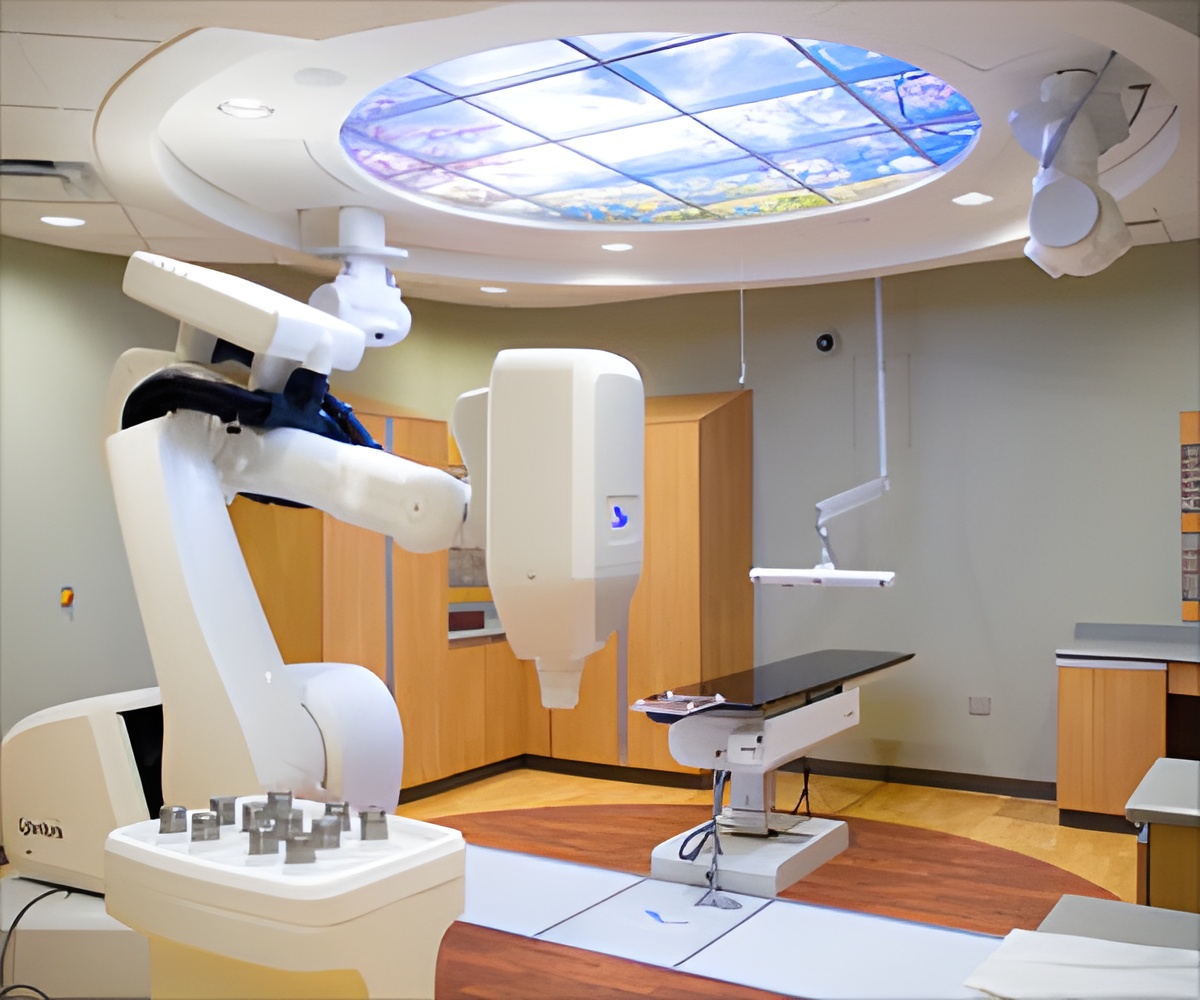CyberKnife an advanced non- invasive radioablation procedure provides an effective treatment option for prostate cancer, reducing pain, time and hospital stay.

Prostate Cancer
Prostate cancer is one of the leading cancers among men in America, next to skin cancer. 240,000 men in U.S are diagnosed with prostate cancer with 30,000 deaths each year. Men who are affected with prostate cancer are usually over 65 years of age with the growth of this tumor resulting in frequent urination.TOP INSIGHT
Cyberknife is a non-invasive alternate treatment method for prostate cancer, reducing overall treatment time and pain for the patients.
- Immobilization procedure: Current radiation methods require patients to be immobilized for a period of time to prevent movement of the tumor during the procedure. The immobilization procedures are uncomfortable and sometimes painful. Rectal balloons may have to be inserted into the rectum to harden it and for better imaging. This further increases discomfort.
- Duration: Traditional radiotherapy methods require 8 to 9 sessions. These methods try and focus on the tumor but internal movements, like movement due to gas, requires coverage of a larger area in the rectum. The dosage would have to be spaced to reduce damage to healthy tissues and is therefore spread over 8 to 9 weeks.
- Radiation damage: There is a fair amount of radiation damage to surrounding tissues resulting in side effects
- Increased risk of Alzheimer’s due to Androgen deprivation therapy(ADT): ADT is a non-invasive procedure used in the treatment of prostate cancer. Dr Nizam Shah and colleagues studied patients from Stanford University and Mt. Sinai hospitals to trace the effects of androgen deprivation therapy on prostate cancer patients. The study published recently in the Journal of Clinical Oncology has found an association between the use of ADT and increased risk of Alzheimer’s among prostate cancer patients. 16,000 men with prostate cancer were studied and it was found that patients undergoing ADT were twice as likely to get Alzheimer’s over the next 2 1/2 years than patients receiving other forms of treatment.
Effect of CyberKnife Treatment on 200 Prostate Cancer Patients
200 prostate cancer patients were included in the study and were treated with CyberKnife procedure every other day. The study performed by Leszek Miszczyk and colleagues from M. Sklodowska- Curie Cancer Center and Institute of Oncology shows that CyberKnife technology is an effective treatment method with lower adverse effects. The patients were followed up to 26 months after treatment and their condition was monitored. The results showed that only one patient relapsed after CyberKnife treatment during the period of study, making this a potent treatment method for low risk and intermediate risk patients.How CyberKnife Works and its Advantages
- CyberKnife is a non-invasive procedure that uses stereotatic body radiation treatment method.
- To ensure that the radiation is focused only on the tumor, fiducials,which are metal tumor markers, are placed in the prostate gland.
- Treatment is restricted to 5 to 6 days with the duration of each procedure lasting for 30 to 40 minutes. The overall treatment time is reduced when compared to traditional methods.
- The damage to surrounding tissue is minimal.
- This technique does not require anesthesia.
- Tumors that are hard to reach with conventional surgery can also be treated with this procedure. It can reach the tumor from any angle.
- It is an outpatient procedure and the person can soon return to normal activity.
Prostate cancer is commonly referred to as ‘the silent killer’, an adage that refers to the complete lack of symptoms during the early stages. However, with the advent of medical technology like CyberKnife, the quality of life for prostate cancer patients looks promising, limiting pain and prolonged hospital stays.
References:
1. Leszek Miszczyk, Aleksandra Napieralska, Agnieska Namysl- Kaletka, Grzegorz Glowacki, Kinga Grabinska, Grzorz Wozniak and Malgorzata Stapor- Fudzinska; “Cyberknife-based prostate cancer patient radioablation- early results of irradiation in 200 patients”; Central European Journal of Urology, October 2015
2. Kevin T Nead, Greg Gaskin, Cariad Chester, Samuel Swisher- McClure, Nicholas J Leeper and Nigam H Shah; “Androgen deprivation therapy future Alzheimer’s disease risk”; Jornal of Clinical Oncology, 2015
4. http://www.pennmedicine.org/radiation-oncology/patient-care/treatments/cyberknife/
6. http://med.stanford.edu/news/all-news/2015/12/common-prostate-cancer-treatment-appears-to-double-alzheimers-risk.html
7. http://www.swedish.org/services/radiosurgery-center/conditions-treated/prostate-cancer/comparing-cyberknife-and-radiation
Source-Medindia
 MEDINDIA
MEDINDIA




 Email
Email





![Prostate Specific Antigen [PSA] Prostate Specific Antigen [PSA]](https://www.medindia.net/images/common/patientinfo/120_100/prostate-specific-antigen.jpg)




